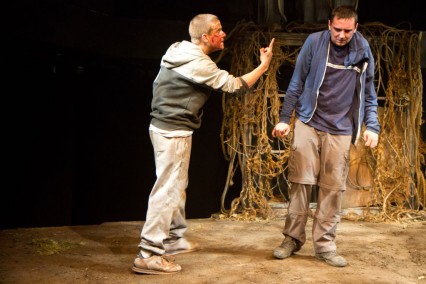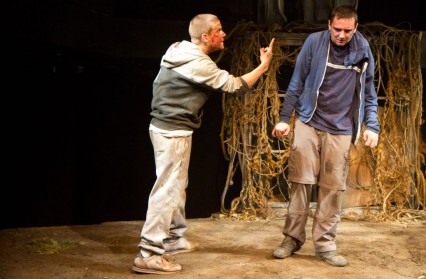Elin Williams travelled to the Bristol Old Vic to witness a collaboration with Sherman Cymru, called Before It Rains by Katherine Chandler.
Katherine Chandler offers the audience at the Bristol Old Vic a slice of raw and authentic Cardiff life in her recent work Before it Rains. Set quite aptly on a dismal, desolate allotment on a Cardiff estate, the play depicts a relationship founded on mutual understanding between vodka-reliant single-mum Gloria, and her Aspergic son Michael. A troubled young newcomer to the estate, Carl, watches from the sidelines, ready to take advantage of Michael’s vulnerable nature by leading him down his own self-paved path of destruction.

The story is beautifully told and punctuated with a sharp, distinctly Welsh humour. Michael (Craig Gazey) is easily influenced by the wild, dangerous Carl (Harry Ferrier) and soon enough, Gloria (Lisa Palfrey) is stirred from her drunken slumber by worry and concern for her defenceless son. This concept of corruption and manipulation is a simple yet interesting one, especially when one considers that the character being corrupted suffers from Aspergers, thus stretching conventional character corruption that little bit further, and arguably giving it a more modern feel. Craig Gazey gives an outstanding and convincing portrayal of Michael, whilst Harry Ferrier is harrowing as the feral Carl. The juxtaposition between these two characters is an excellent device in order to show the different means of survival on such an estate. The scene in which Michael is mercilessly beaten by Carl is a particular highlight for Gazey. In a non-
The humour is sometimes specific to a Welsh audience, but that does not affect the play’s comedic intentions as a whole; you don’t need to be Welsh to appreciate the humorous characteristics of the Cardiffian dialect, but perhaps it would strike a more familiar chord with a Welsh audience. There were some scenes that were non-dialogue and perhaps slightly too long and unnecessarily whimsical in direction. In particular, a lengthy silent scene in which Carl offers Gloria some chips, dances with her, then begins to intimidate her. This didn’t add anything to the script’s intentions and became slightly irrelevant as it progressed. Having said that, a couple of these non-dialogue scenes were concise and coupled with effective lighting, which helped to add to the eerie nature of the script.
The Sherman Cymru play reaches its dramatic climax with the extremities of humankind on display. The image of the physically and mentally abused Michael combined with the image of a decimated Carl is effective. The play then ritually returns in a full narrative circle back to the allotment. The threat of outside corruption has been successfully removed, and so the relationship between Michael and his mother is restored. Michael no longer echoes Carl’s hurtful words to his mother and resumes his position as the loving, thoughtful son. A pleasing role reversal ensues, with Gloria tending to the flowers as Michael watches from a deckchair. Throughout the play, Michael yearns for this specific maternal figure, for a mother who tends and nurtures, and the end of the play conveys this.
Katherine Chandler presents the audience with a simple concept, and a straightforward and conventional narrative arch, but spiced with that vital pinch of modern setting and contemporary happenings, the play becomes more than what it may first appear. Written with true Cardiffian grit and brutal honesty, Before it Rains holds up an unrelenting mirror on Cardiff, and actually, on society as a whole. Before it Rains is evidence of fresh, Welsh writing that doesn’t shy away from difficult topics, in this case, Asperger’s Syndrome, and addresses the difficulties of surviving on certain modern-day estates.
Anglo-
For more Sherman Cymru performances, click here.
For more Bristol Old Vic performances, click here.
Elin Williams is a regular contributor to Wales Arts Review.












